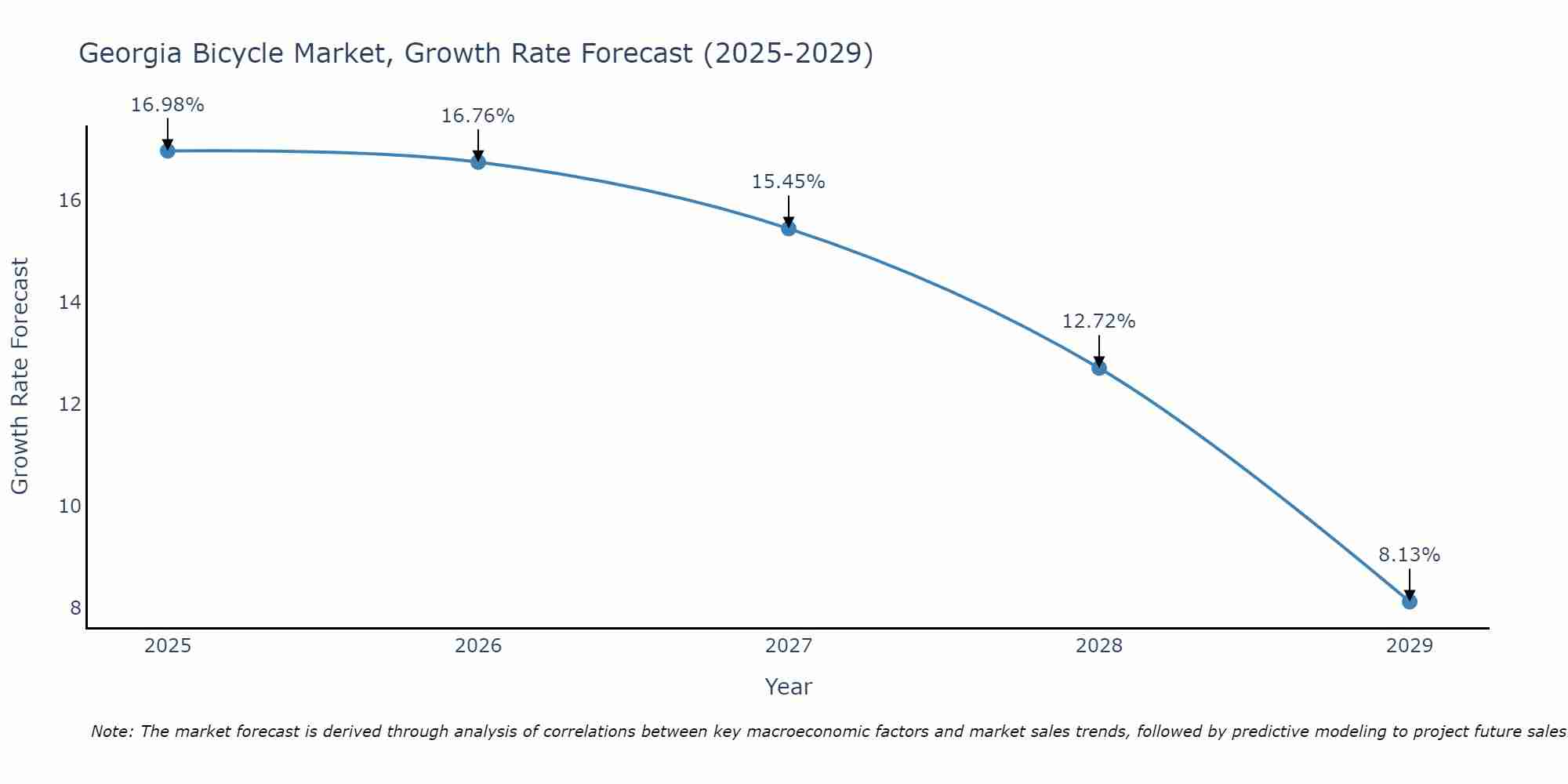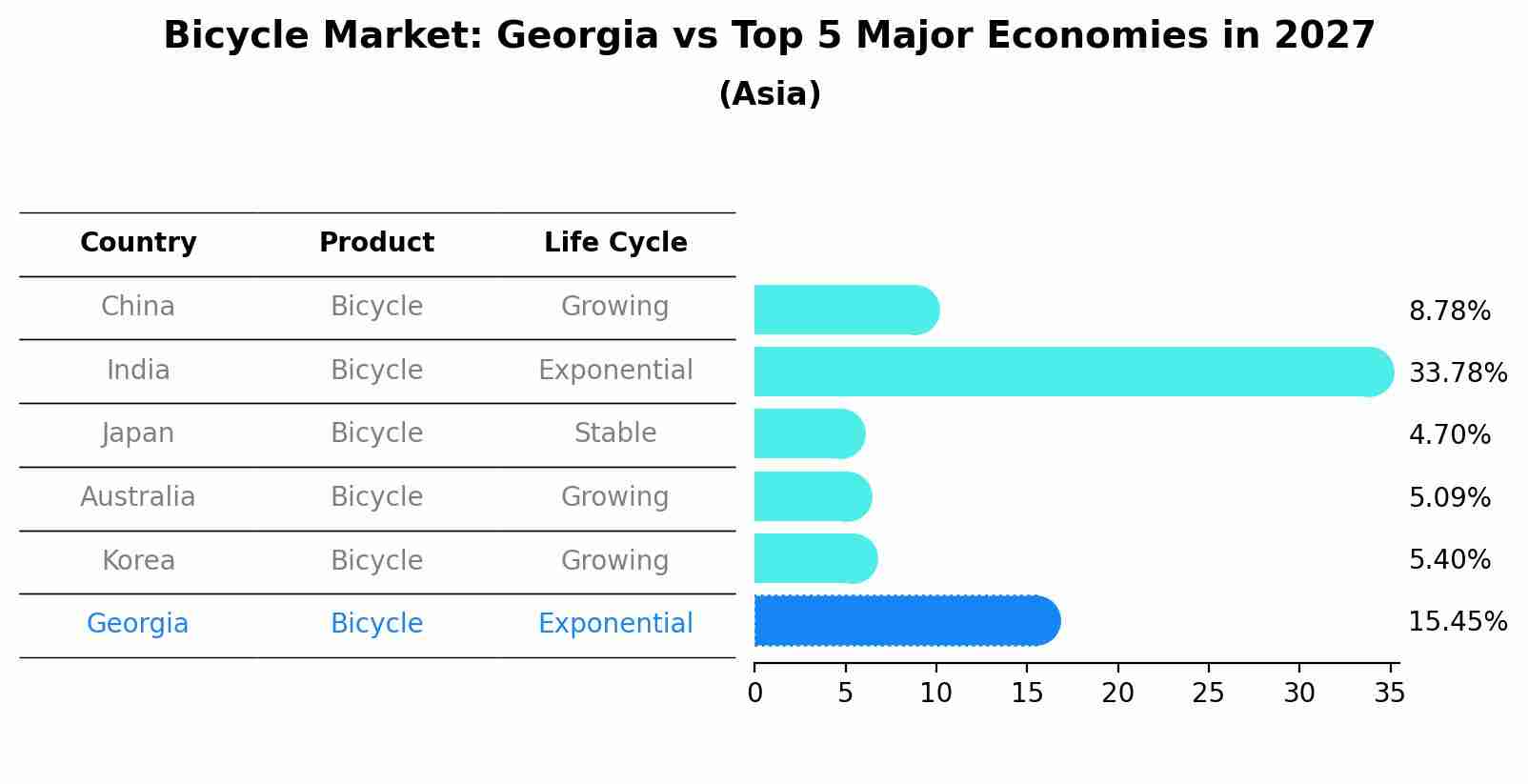Georgia Bicycle Market Outlook | Revenue, Value, Size, Growth, Analysis, COVID-19 IMPACT, Industry, Trends, Share, Forecast & Companies
| Product Code: ETC362160 | Publication Date: Aug 2022 | Updated Date: Aug 2025 | Product Type: Market Research Report | |
| Publisher: 6Wresearch | Author: Shubham Deep | No. of Pages: 75 | No. of Figures: 35 | No. of Tables: 20 |
Georgia Bicycle Market Size Growth Rate
The Georgia Bicycle Market could see a tapering of growth rates over 2025 to 2029. Beginning strongly at 16.98% in 2025, growth softens to 8.13% in 2029.

Bicycle Market: Georgia vs Top 5 Major Economies in 2027 (Asia)
By 2027, Georgia's Bicycle market is forecasted to achieve a exponential growth rate of 15.45%, with China leading the Asia region, followed by India, Japan, Australia and South Korea.

Georgia Bicycle Market Synopsis
The Georgia bicycle market is a growing and diverse industry catering to a wide range of consumers, from casual riders to competitive cyclists. With a strong emphasis on outdoor recreation and fitness, the market offers a variety of products including road bikes, mountain bikes, hybrids, and electric bikes. Local bike shops and online retailers play a significant role in providing sales and services to customers, while cycling events and clubs contribute to the vibrant cycling community in the state. Factors such as increasing awareness of health and environmental benefits, as well as infrastructure improvements for cyclists, are driving the market`s expansion. Overall, the Georgia bicycle market presents opportunities for manufacturers, retailers, and service providers to tap into the state`s growing interest in cycling.
Georgia Bicycle Market Trends
The Georgia bicycle market is experiencing a shift towards electric bikes, with an increasing number of consumers opting for e-bikes for their convenience and eco-friendly appeal. There is also a growing interest in gravel bikes, reflecting a trend towards versatile and adventure-ready bicycles that can handle a variety of terrains. In addition, there is a focus on sustainability and locally-made products, with consumers showing a preference for supporting Georgia-based bike manufacturers and retailers. The pandemic has also spurred a rise in bicycle sales as people seek alternative modes of transportation and outdoor recreational activities. Overall, the Georgia bicycle market is witnessing a combination of technological advancements, changing consumer preferences, and a heightened awareness of sustainability and health benefits driving the current trends.
Georgia Bicycle Market Challenges
In the Georgia Bicycle Market, some key challenges include increasing competition from online retailers, fluctuating consumer preferences, and a lack of dedicated biking infrastructure in certain areas. Online retailers often offer lower prices and a wider selection, making it harder for local bike shops to compete. Additionally, consumer preferences for bike styles, features, and brands can change quickly, requiring businesses to adapt and stay ahead of trends. The lack of proper biking infrastructure, such as bike lanes and designated paths, in some parts of Georgia can also deter potential cyclists and limit the market`s growth. Overcoming these challenges will require strategic marketing efforts, partnerships with local governments to improve infrastructure, and a focus on providing unique, personalized experiences to customers.
Georgia Bicycle Market Investment Opportunities
The Georgia bicycle market offers promising investment opportunities in various segments. With increasing interest in outdoor activities and eco-friendly transportation options, there is a growing demand for high-quality bicycles, accessories, and related services. Investing in bike shops or rental services in popular tourist destinations such as Savannah or Atlanta could be lucrative. Additionally, there is potential in the electric bike segment as consumers seek alternative modes of transportation for commuting or leisure. Supporting infrastructure development, such as bike lanes and cycling events, can also present investment opportunities. Collaborating with local bike manufacturers or suppliers to offer unique products tailored to the Georgia market could help investors capitalize on the growing interest in cycling in the region.
Jordan Agar Market Government Policies
The Georgia Bicycle Market is influenced by several government policies aimed at promoting cycling and improving infrastructure for cyclists. The state has implemented initiatives such as the Georgia Bike Plan, which outlines strategies for enhancing bicycle safety and access. Additionally, Georgia has invested in creating bike-friendly communities through programs like the Safe Routes to School initiative, which encourages children to bike to school safely. Furthermore, the state has allocated funding for the development of bike lanes, trails, and other cycling infrastructure to support active transportation. Overall, the government`s policies in Georgia are focused on promoting cycling as a sustainable and healthy mode of transportation, while also improving road safety for cyclists.
Georgia Bicycle Market Future Outlook
The future outlook for the Georgia Bicycle Market appears promising as the demand for bicycles continues to rise due to a growing interest in outdoor activities, fitness, and sustainable transportation options. With an increased focus on health and wellness, coupled with efforts to reduce carbon emissions, more individuals are turning to cycling as a preferred mode of transportation and recreation. Additionally, the expansion of bike-sharing programs and infrastructure improvements in urban areas are likely to further drive the market growth. As the trend towards a more active and environmentally conscious lifestyle continues, the Georgia Bicycle Market is expected to experience steady growth, presenting opportunities for manufacturers, retailers, and service providers to capitalize on the growing demand for bicycles and related accessories.
Key Highlights of the Report:
- Georgia Bicycle Market Outlook
- Market Size of Georgia Bicycle Market, 2021
- Forecast of Georgia Bicycle Market, 2031
- Historical Data and Forecast of Georgia Bicycle Revenues & Volume for the Period 2018 - 2031
- Georgia Bicycle Market Trend Evolution
- Georgia Bicycle Market Drivers and Challenges
- Georgia Bicycle Price Trends
- Georgia Bicycle Porter's Five Forces
- Georgia Bicycle Industry Life Cycle
- Historical Data and Forecast of Georgia Bicycle Market Revenues & Volume By Product for the Period 2018 - 2031
- Historical Data and Forecast of Georgia Bicycle Market Revenues & Volume By Mountain Bikes for the Period 2018 - 2031
- Historical Data and Forecast of Georgia Bicycle Market Revenues & Volume By Hybrid Bikes for the Period 2018 - 2031
- Historical Data and Forecast of Georgia Bicycle Market Revenues & Volume By Road Bikes for the Period 2018 - 2031
- Historical Data and Forecast of Georgia Bicycle Market Revenues & Volume By Cargo Bikes for the Period 2018 - 2031
- Historical Data and Forecast of Georgia Bicycle Market Revenues & Volume By Others for the Period 2018 - 2031
- Historical Data and Forecast of Georgia Bicycle Market Revenues & Volume By Technology for the Period 2018 - 2031
- Historical Data and Forecast of Georgia Bicycle Market Revenues & Volume By Electric for the Period 2018 - 2031
- Historical Data and Forecast of Georgia Bicycle Market Revenues & Volume By Conventional for the Period 2018 - 2031
- Historical Data and Forecast of Georgia Bicycle Market Revenues & Volume By End-user for the Period 2018 - 2031
- Historical Data and Forecast of Georgia Bicycle Market Revenues & Volume By Men for the Period 2018 - 2031
- Historical Data and Forecast of Georgia Bicycle Market Revenues & Volume By Women for the Period 2018 - 2031
- Historical Data and Forecast of Georgia Bicycle Market Revenues & Volume By Kids for the Period 2018 - 2031
- Historical Data and Forecast of Georgia Bicycle Market Revenues & Volume By Distribution Channel for the Period 2018 - 2031
- Historical Data and Forecast of Georgia Bicycle Market Revenues & Volume By Online for the Period 2018 - 2031
- Historical Data and Forecast of Georgia Bicycle Market Revenues & Volume By Offline for the Period 2018 - 2031
- Georgia Bicycle Import Export Trade Statistics
- Market Opportunity Assessment By Product
- Market Opportunity Assessment By Technology
- Market Opportunity Assessment By End-user
- Market Opportunity Assessment By Distribution Channel
- Georgia Bicycle Top Companies Market Share
- Georgia Bicycle Competitive Benchmarking By Technical and Operational Parameters
- Georgia Bicycle Company Profiles
- Georgia Bicycle Key Strategic Recommendations
Frequently Asked Questions About the Market Study (FAQs):
- Single User License$ 1,995
- Department License$ 2,400
- Site License$ 3,120
- Global License$ 3,795
Search
Thought Leadership and Analyst Meet
Our Clients
Related Reports
- Germany Breakfast Food Market (2026-2032) | Industry, Share, Growth, Size, Companies, Value, Analysis, Revenue, Trends, Forecast & Outlook
- Australia Briquette Market (2025-2031) | Growth, Size, Revenue, Forecast, Analysis, Trends, Value, Share, Industry & Companies
- Vietnam System Integrator Market (2025-2031) | Size, Companies, Analysis, Industry, Value, Forecast, Growth, Trends, Revenue & Share
- ASEAN and Thailand Brain Health Supplements Market (2025-2031) | Strategy, Consumer Insights, Analysis, Investment Trends, Opportunities, Growth, Size, Share, Industry, Revenue, Segments, Value, Segmentation, Supply, Forecast, Restraints, Outlook, Competition, Drivers, Trends, Demand, Pricing Analysis, Competitive, Strategic Insights, Companies, Challenges
- ASEAN Bearings Market (2025-2031) | Strategy, Consumer Insights, Analysis, Investment Trends, Opportunities, Growth, Size, Share, Industry, Revenue, Segments, Value, Segmentation, Supply, Forecast, Restraints, Outlook, Competition, Drivers, Trends, Demand, Pricing Analysis, Competitive, Strategic Insights, Companies, Challenges
- Europe Flooring Market (2025-2031) | Outlook, Share, Industry, Trends, Forecast, Companies, Revenue, Size, Analysis, Growth & Value
- Saudi Arabia Manlift Market (2025-2031) | Outlook, Size, Growth, Trends, Companies, Industry, Revenue, Value, Share, Forecast & Analysis
- Uganda Excavator, Crane, and Wheel Loaders Market (2025-2031) | Strategy, Consumer Insights, Analysis, Investment Trends, Opportunities, Growth, Size, Share, Industry, Revenue, Segments, Value, Segmentation, Supply, Forecast, Restraints, Outlook, Competition, Drivers, Trends, Demand, Pricing Analysis, Competitive, Strategic Insights, Companies, Challenges
- Rwanda Excavator, Crane, and Wheel Loaders Market (2025-2031) | Strategy, Consumer Insights, Analysis, Investment Trends, Opportunities, Growth, Size, Share, Industry, Revenue, Segments, Value, Segmentation, Supply, Forecast, Restraints, Outlook, Competition, Drivers, Trends, Demand, Pricing Analysis, Competitive, Strategic Insights, Companies, Challenges
- Kenya Excavator, Crane, and Wheel Loaders Market (2025-2031) | Strategy, Consumer Insights, Analysis, Investment Trends, Opportunities, Growth, Size, Share, Industry, Revenue, Segments, Value, Segmentation, Supply, Forecast, Restraints, Outlook, Competition, Drivers, Trends, Demand, Pricing Analysis, Competitive, Strategic Insights, Companies, Challenges
Industry Events and Analyst Meet
Whitepaper
- Middle East & Africa Commercial Security Market Click here to view more.
- Middle East & Africa Fire Safety Systems & Equipment Market Click here to view more.
- GCC Drone Market Click here to view more.
- Middle East Lighting Fixture Market Click here to view more.
- GCC Physical & Perimeter Security Market Click here to view more.
6WResearch In News
- Doha a strategic location for EV manufacturing hub: IPA Qatar
- Demand for luxury TVs surging in the GCC, says Samsung
- Empowering Growth: The Thriving Journey of Bangladesh’s Cable Industry
- Demand for luxury TVs surging in the GCC, says Samsung
- Video call with a traditional healer? Once unthinkable, it’s now common in South Africa
- Intelligent Buildings To Smooth GCC’s Path To Net Zero


















